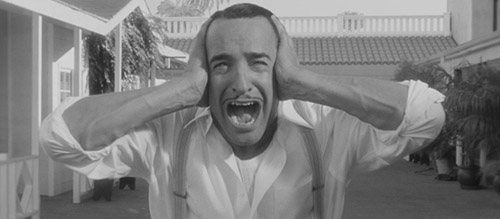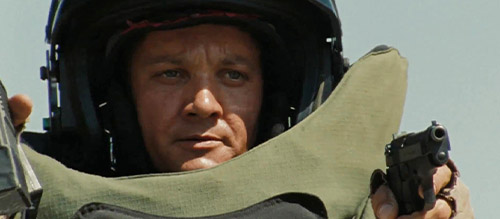21st Century Best Picture Oscar Winners Ranked
15. The Artist – 2012
The other nominees: The Descendants; Extremely Loud & Incredibly Close; The Help; Hugo; Midnight in Paris; Moneyball; The Tree of Life; War Horse
There is something so beautifully expressive about The Artist, yet something equally as self-celebratory, and it is the dichotomy between these two things that makes this Michel Hazanavicius production such a watchable film and such a typical Academy choice for Best Picture.
The Artist is a rare silent film for the modern age; a movie without a language barrier and very much pinpointing your attention towards the filmmaking and performances as opposed to the script. It’s shot in black and white, set within recreations of old Hollywood studios and apartment blocks. Its hero, played by the traditionally handsome French actor Jean Dujardin, is an actor and filmmaker losing his grip on the spotlight, his antagonist also being his lover (Bérénice Bejo). It’s all very classic Hollywood.
There are moments of individualistic expression throughout the film – viewers will note one particular sequence that is quite the surprise and remains enjoyable a decade later – but for the most part The Artist is a love letter to the old Hollywood movie machine and as such takes a lot of its ideas from those films that have long been considered classics. In short, there is nothing “fresh” about The Artist other than that its very existence is one that flies in the face of commercial filmmaking in the 21st century, and for this reason it is quite the divisive watch.
Whether The Artist is exceptional or deserving or not, it is an interesting outlier in this list of Best Picture winners that has thus far produced so many films of a similar style and tone. It stands out, it brings joy, it offers a reason to look back on the history of cinema and celebrate the achievements of its early days, and for cinephiles, movie lovers and industry professionals, there is value to be found in that.
14. The Hurt Locker – 2010
The other nominees: Avatar; The Blind Side; District 9; An Education; Inglourious Basterds; Precious: Based on the Novel ‘Push’ by Sapphire; A Serious Man; Up; Up in the Air
The Hurt Locker is a superb film. Its combination of tension and trauma, and its unflinching and close-up look at dealing with the potential of death at every turn, is truly phenomenal. As is the star-making performance from Jeremy Renner. But it isn’t anyone’s favourite film, nor do its politics have the same impact that they used to.
The first film directed by a woman to earn Best Picture at the Oscars, The Hurt Locker is perhaps more important socially and contextually than a lot of its rivals in this list, the significance of a woman finally earning the award of The Academy’s biggest prize being a breakthrough moment for women filmmakers.
On the screen, The Hurt Locker is tense and trim. What you see in the opening moments is what you get, and it’s all a feature example of the talents of its director whom had been making films since the early 1980s. Set in Iraq during the war on terror, the perspective on which has changed massively since the 2000s, The Hurt Locker is very much a “look at how sad our soldiers get after bombing your country to pieces” movie; an unapologetically US-centric vision of international tensions with little thought as to critiquing the war itself from any perspective other than the very personal one at hand. For what it’s trying to do, it is sensational and in parts revolutionary (some of the techniques brought a new wave of practical effects into the Hollywood mainstream), but what it’s trying to say isn’t all that palatable to a large portion of modern audiences; especially those who watch the Oscars each year.
Recommended for you: Kathryn Bigelow Movies Ranked
13. Gladiator – 2001
The other nominees: Chocolat; Crouching Tiger: Hidden Dragon; Erin Brockovich; Traffic
Ben-Hur, The Sound of Music, Titanic, Gladiator. These are the films that are most synonymous with the distinction of “Best Picture at The Academy Awards”. Each film, released over a period of 40 years between 1960 and 2000, represent the very height of the cinematic form in terms of grand cinematic achievement and wide popular appeal. In many ways, Gladiator was the last true Best Picture winner – the last film awarded by The Academy of Motion Picture Arts & Sciences to have mass appeal that struck into the wider social conversation.
While The Lord of the Rings is perhaps the last blockbuster of sorts to be awarded Best Picture (in 2004), Gladiator is free of the fantasy shackles that restricted Lord of the Rings’ popular appeal, and is a modern archetype for the purpose of cinema in the modern space.
The year 2000 was one in which wide access to the internet was fast approaching, home television sets were growing bigger, home video was a booming market that brought classics into our homes, and Gladiator was a spectacle that simply couldn’t be enjoyed to its maximum potential in any setting other than the cinema. The CG was, for its day, utterly unmissable, Russell Crowe equally as interesting. It had a director in Ridley Scott who was a master of his craft, it was set close to 2,000 years ago with period-appropriate costumes and an ancient Rome brought to life. It was everything a moviegoer could want as a form of escapism, and it won the votes of The Academy in the acting, directing, set design, costume design, score, song and visual effects categories. When you tick that many boxes, you win Best Picture.
Looking back, Gladiator isn’t a perfect movie. The film’s production woes – such as making a start to filming despite not having a complete script – are apparent in places, and some of its choices and techniques are very of their time, but of all the films on this list it is probably the best known and is certainly a spectacular example of high budget Hollywood filmmaking; the kind of movie making that exemplifies what separates Hollywood from the films made in the rest of the world.
Recommended for you: Ridley Scott Films Ranked
12. Nomadland – 2021

2021 Oscars Best Picture Nominees Ranked
The other nominees: The Father; Judas and the Black Messiah; Mank; Minari; Promising Young Woman; Sound of Metal; The Trial of the Chicago 7
The Oscars in 2021 were the only awards ceremony to be affected by the Coronavirus pandemic, the broadcast of the 93rd Academy Awards delayed until late April so that the year’s greatest filmmakers could share a space in the tradition of all who came before, albeit socially distanced.
The winner of Best Picture was a film that could be telegraphed from early on in the ceremony – Nomadland had already won big in Best Director, Adapted Screenplay, Editing, Leading Actress and Cinematography – but was also as predictable as any Best Picture win in recent years, Chloé Zhao’s drama with documentary elements telling of a woman living on the outskirts of modern society, a nomad without a fixed home, without much human contact, and absent from so much of what we each consider to be the normal day-to-day. It was a film that echoed to each of us how it felt to be isolated, to be separated from society, but it also reminded us of the beauty we can find in each other and how much of a profound effect a deep conversation or barrel of laughs can have – it was The Pandemic: The Movie.
Shot in a mix of beautiful steady cam and intimate handheld moments, and anchored in each frame by Frances McDormand at her most raw, open and truthful, Nomadland oozed filmmaking class in all aspects of its production and excelled in capturing both a unique perspective of the modern United States and a more universal discomfort amongst the Western populous.
Time may not be as kind to this Best Picture winner as a number of more timeless offerings given its specificity to the experience of the pandemic and our wider post-recession landscape, but the work of Zhao (as writer, director and editor) and Frances McDormand (as star) will forever be etched into the annals of film history nonetheless; an important reminder of the soothing, cathartic nature of cinema even in our moments of greatest need.
11. Everything Everywhere All at Once – 2023

2023 Oscars Best Picture Nominees Ranked
The other nominees: All Quiet on the Western Front; Avatar: The Way of Water; The Banshees of Inisherin; Elvis; The Fabelmans; Tár; Top Gun: Maverick; Triangle of Sadness; Women Talking
Everything Everywhere All at Once felt like a revolution, both in cinemas and at the Oscars. Technically impressive with a do-it-yourself behind-the-scenes attitude, and as compelling in how it was told as much as in what it was telling, this sophomore hit from directing duo Daniel Kwan and Daniel Scheinert (known as Daniels) went against the grain of the typical just-behind-the-times (and almost always based on true events) Oscars Best Picture nominees and won. It was one of those rare feel-good Oscars moments.
Combining emotive story beats that are as impactful in short social media clips as they are as part of a complete narrative – illustrating the directors’ understanding of modern media consumption and this film’s pointed commentary regarding how cinema should embrace that – Everything Everywhere All at Once was excitement and passion rolled into a story of love and acceptance, the most 2022 movie of 2022.
There were bits of Jackie Chan, Steven Spielberg, The Matrix and In the Mood for Love, with a loving reference to Ratatouille acting as the cherry on top of a wholly cinematic offering. Wonderfully imaginative and expressive, and unique to the Daniels and the generation of filmmakers they would come to represent courtesy of its high contrast cinematography, contemporary themes, and segmented presentational style, it felt like there had been nothing in cinema like this film before despite all of its recognisable aspects, making it a unique, timely (though possibly not timeless), enjoyable Best Picture winner that helped to usher in a new style of filmmaking.




